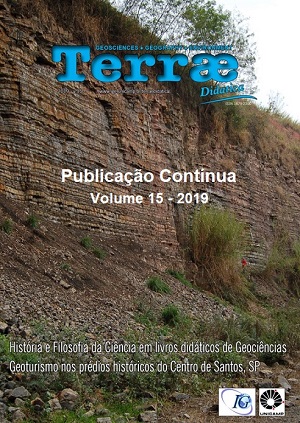Abstract
The Sustainable Development Goals (SDGs) are the main thrust of the current UN 2030 Agenda, and in order for them to be effective, it is essential to formally and informally educate youth and adults to change how they relate socially, politically and environmentally. This paper seeks to analyze the relation between the SDGs and educational Geography contents proposed by the Brazilian Common Core State Standards (CCSS), and to reflect on their possible application in classes and interdisciplinary projects involving the discipline. Thus, we used as the theoretical basis the UN and UNESCO texts on SDGs, in addition to the CCSS for Elementary School. Finally, the subjects and contents regarding SDGs 1, 2, 3 and 4 and the CCSS for Geography were compared. A list of possible relations between them and the examples of approaches and learning methods for the SDGs proposed by UNESCO was established.
References
Ministério de Educação e Cultura (MEC). (2017). Base Nacional Comum Curricular (BNCC). Brasília. MEC. Disponível em: http://basenacionalcomum.mec.gov.br/a-base. Acesso: 15 fev.2018.
Moraes, A. C. R. (2002). A contribuição social do ensino de Geografia. In: Oliveira, C. A. C.; Mathias, M. T.; Rodrigues, R. C. A.; & Duarte, R. G. (2002). Anais do Ciclo de Debates e Palestras sobre Reformulação Curricular e Ensino de Geografia. Departamento de Ciências Humanas e Integração Social. UERJ.
Organização das Nações Unidas (ONU). (2019). Sustainable Development Goals. Knowledge Plataform https://sustainabledevelopment.un.org/sdgs Acesso: 02 jul.2019.
Organização das Nações Unidas (ONU). (2015). The Millennium Development Goals Report 2015. New York: United Nations.
Plataforma Agenda 2030. Disponível em: http://www.agenda2030.org.br/sobre/. Acesso: 16 jul.2019.
Pontuschka, N. N.; Paganelli, T. I.; & Cacete, N. H. (2009). Para ensinar e aprender Geografia. São Paulo: Cortez.
Roma, J. C. (2019). Os Objetivos de Desenvolvimento do Milênio e sua transição para os Objetivos de Desenvolvimento Sustentável. In: Ciência e cultura, v. 71, nº 1. São Paulo, jan. Disponível em: http://cienciaecultura.bvs.br/scielo.php?script=sci_arttext&pid=S0009-67252019000100011. Acesso: 24 abr.2019.
Sachs, J. (2010). From Millennium Development Goals to Sustainable Development Goals. The Lancet, 379. Disponível em: https://www.thelancet.com/journals/lancet/article/PIIS0140-6736(12)60685-0/fulltext. Acesso: 20 jun.2019.
Santos, M. (2002). Por uma Geografia Nova. São Paulo: Edusp.
Silva, E. R. A. da; Peliano, A. M.; & Chaves, J. V. (2018). Agenda 2030: ODS – Metas Nacionais dos Objetivos de Desenvolvimento Sustentável. IPEA. Disponível em: http://www.ipea.gov.br/portal/images/stories/PDFs/livros/livros/180801_ods_metas_nac_dos_obj_de_desenv_susten_propos_de_adequa.pdf. Acesso: 16 jul. 2019.
UNESCO. (2017). Educação para os Objetivos de Desenvolvimento Sustentável. Objetivos de aprendizagem. Paris: Unesco. Disponível em: https://unesdoc.unesco.org/ark:/48223/pf0000252197. Acesso: 07 jun.2019.
A Terrae Didatica utiliza a licença do Creative Commons (CC), preservando assim, a integridade dos artigos em ambiente de acesso aberto.


